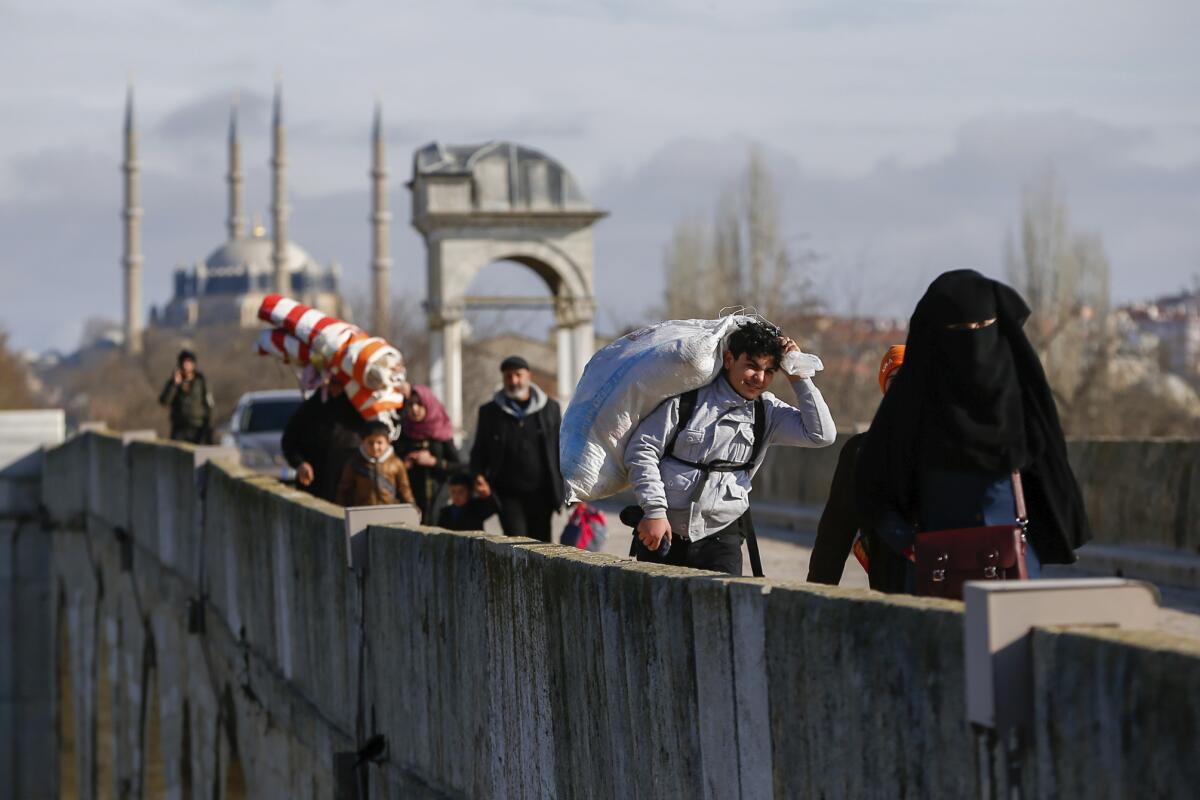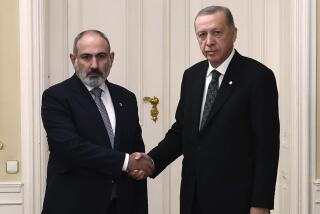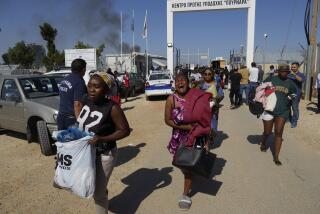Turkey deploying special forces to border amid migrant surge

- Share via
ANKARA, Turkey — Turkey said Thursday that it would deploy special forces along its land border with Greece to prevent Greek authorities pushing back people trying to cross into Europe, after Turkey declared its previously guarded gateways to Europe open.
Thousands of refugees and other migrants have tried to cross into Greece from the Turkish land and sea border in the past week. Clashes have been frequent, with Greek police firing tear gas, stun grenades and water cannons to repel thousands of people trying to breach the border. Greek authorities say Turkish police have also fired tear gas at them to disperse border guards.
Turkey says Greek authorities were also firing live ammunition at the migrants, and Interior Minister Suleyman Soylu said Wednesday that Turkey would make a case in the European Court of Human Rights for a migrant it says was shot dead by Greek authorities on the border. The Greek government has denied any such incident occurred, calling it “fake news.”
Soylu, who visited the border area Thursday, said Turkey would deploy 1,000 special forces along its land border to prevent Greek authorities from pushing back those attempting to cross.
“As of this morning ... we are bringing 1,000 fully equipped special forces police [along] the Meric river system to prevent the pushbacks,” Soylu said. “With the help of Zodiac boats they will [stop] those who mistreat people.”
Soylu said Greece had tried to push back around 4,900 migrants, in violation of international conventions, and accused the European Union and Europe’s border protection agency Frontex of remaining silent.
An estimated 4,000-5,000 people were near the Pazarkule border crossing, opposite the Greek village of Kastanies, and were being prevented from crossing, Soylu said.
“It is a border gate, they are obliged to take them in. They are obliged to take in asylum-seekers,” the minister said.
But he added the migrants were not obliged to use the official border crossing and could cross anywhere along the roughly 200-kilometer (125-mile) -long border. Much of the border is demarcated by a river, and many have tried wading, rowing or swimming across it.
“I want to say that there is no rule that says they have to cross from Pazarkule,” Soylu said.
The minister asserted more than 130,000 peoplehad crossed into Greece since Feb. 27, when Turkey made good on a threat to open its borders. He said around 20%-25% of those who reached Greece were Syrians.
There was no evidence to support the number. Although hundreds of people have managed to cross, most appear to have been caught by Greek authorities. Many have said they have been summarily pushed back into Turkey after being detained.
Greek authorities said that from Saturday morning until Thursday morning, they had thwarted 34,778 attempts to cross, and 244 people had been arrested. That includes 6,955 attempts to cross the border in the 24 hours between Wednesday morning and Thursday morning.
Turkish President Recep Tayyip Erdogan’s decision to open its gateways to Europe has raised concerns within the European Union, which was holding a foreign ministers’ meeting in Zagreb, Croatia.
His move came amid a Russia-backed Syrian government offensive into Syria’s northwestern Idlib province, where Turkish troops are fighting. The offensive has killed dozens of Turkish troops and sent nearly a million Syrian civilians toward Turkey’s sealed border.
Erdogan and Russian President Vladimir Putin were meeting in Moscow Thursday for talks aimed at ending the hostilities in northwestern Syria.
Turkey currently hosts more than 3.5 million Syrian refugees, and Erdogan had frequently threatened to open Turkey’s borders to Europe. He maintains the EU has not upheld its end of a more than 6 billion-euro deal designed to stem the flow of migrants into Europe, after more than a million people entered the EU in 2015.
The head of the International Federation of Red Cross and Red Crescent Societies, Francesco Rocca, visited the Greek side of the border Thursday, and said he hoped a political solution would be found soon. He said he saw through the border fence that there were hundreds of people, including women and children, waiting on the Turkish side of the border.
“Every country, every institution like (the) European Union has the right to set up policies, but these policies must never affect they dignity of human beings,” he said. “It’s very, very sad that we have seen again human beings treated as a political weapon. As a tool for politics. And this is unacceptable.”
He said “everyone should be grateful to Turkey” for sheltering millions of refugees for years, but ”political reason cannot justify the decision to open the border.”
Greece has called the situation a direct threat to its national security and imposed emergency measures to carry out swift deportations and freeze asylum applications for one month — moves which have come under criticism from human rights groups and refugee aid agencies.
German Foreign Minister Heiko Maas said Thursday it was important that Greece not be left alone and that a “united European answer” be found.
“For us it’s clear: he EU must continue to financially and increasingly support the efforts of Turkey when it comes to the admission of refugees and migrants,” Maas said.
Greece’s sea border has also come under pressure, with hundreds heading to Greek islands from the nearby Turkish coast. A child died when the dinghy he was in capsized off the coast of the Greek island of Lesbos earlier this week.
Soylu, the interior minister, said he had received instructions from Erdogan for Turkish authorities to prevent migrants from crossing by sea to avert drownings.
There were no sea crossings Wednesday, when the area faced high winds and rough seas.
More to Read
Sign up for Essential California
The most important California stories and recommendations in your inbox every morning.
You may occasionally receive promotional content from the Los Angeles Times.













